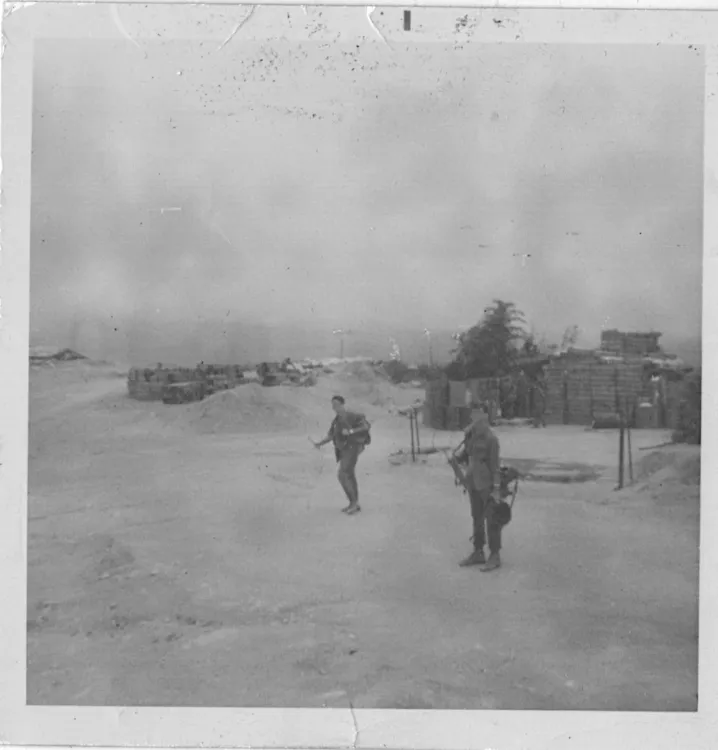My Husband, Last Day in Vietnam

Credit: Personal album. He is the figure standing on the right side of the picture. He had helicoptered back to Chu Lai on that last day in the country. He spent most of his combat service in the area around Chu Lai, south of Da Nang. He doesn't remember who was with him in the photo.
"...we heard, you know, shots fired. It was like a hot zone... the helicopter is hovering over this rice paddy, and it was just like five feet above the rice paddy. And he starts pushing us out..."
The man who was pushing was a lieutenant colonel who had helicoptered my husband to the hot zone. It was the last week of my husband's deployment to Vietnam. He landed in that rice paddy, with his gear, water up to his knees. Hearing about such episodes motivated me to write a book about my husband's combat experience.
This is not my first venture in book writing. A few of the books I've written are good. Most are not. The good ones began, as this one has, with a clear purpose.
My husband saw active combat in Vietnam fifty-five years ago. Early in our marriage I heard virtually nothing about his tour of duty. More recently, he has begun to share, although he still does not speak with emotion. Even the most jarring events are sometimes described with almost flat effect.
My husband's narratives are true history, history as it was lived by thousands of other soldiers. The story of Vietnam has been told by journalists, historians, and filmmakers. But, as any historian knows, it is first-person accounts that are most true, and therefore most valuable.
Those of us who lived through the Vietnam era, stateside, remember the news reports at home. We remember government bulletins. And then we remember photos, splashed across the newspaper front pages and evening news broadcasts. It was a disconnect between government bulletins and news reports that disillusioned much of my generation. We lost faith in government, a faith that had been part of our collective psychology through the 1950s.
Vietnam was the first war in which citizens at home were given front row seats to action on the battlefield. We saw a young girl with her clothing burned off by napalm, napalm that American forces had dropped. We saw a soldier executed at close range by a South Vietnamese official. We saw Buddhist monks immolate themselves.
This was war as we had never known it.
While it is instructive to read news bulletins from that time, and to pour through historians' accounts, there is no report as valuable as that of someone who lived through the thick of battle.
When my husband first joined his company at Chu Lai in 1968, he was accompanied by 36 other soldiers. These thirty-seven were replacing the same number that had been wiped out days before in a minefield disaster.
My husband explains, "...and we found out they had walked through a minefield the outfit that I went to. All these people had been blown up."
After a year had passed, only seven of the original thirty seven that had joined the company with my husband remained. Most of the absent had been injured or killed.
My husband describes what it was like, walking around, "You'd be out in the field, and people would be a couple of hundred yards in front of you. You'd hear an explosion. A guy stepped on a mine. A helicopter comes takes em away and you never see them again. You don't know ..."
As I prepare to write this book, several challenges confront me. There is the usual challenge of a blank page. Nothing will be on that page unless I write it. Then there is the truth. Being true to the record in this case is a moral obligation. Finally, there is this: the clock.
My husband and I have each lived for more than three quarters of a century. It is naive to think I have the luxury of time. Even if I live long enough to finish the book, will I be able? Will my husband continue to remember those events of so long ago, with clarity?
At some point, the final chapter of our lives closes, for all of us. I believe in the value of this book. I believe it has worth not only for my husband and me, and for our descendants. If done properly, it will also add, modestly, to the already voluminous record on the war in Vietnam.